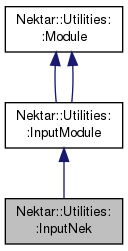|
Nektar++
|
|
Nektar++
|
#include <InputNek.h>


Public Member Functions | |
| InputNek (MeshSharedPtr p_m) | |
| virtual | ~InputNek () |
| virtual void | Process () |
| Processes Nektar file format. | |
 Public Member Functions inherited from Nektar::Utilities::InputModule Public Member Functions inherited from Nektar::Utilities::InputModule | |
| InputModule (FieldSharedPtr p_m) | |
| void | AddFile (string fileType, string fileName) |
| InputModule (MeshSharedPtr p_m) | |
| void | OpenStream () |
| Open a file for input. | |
 Public Member Functions inherited from Nektar::Utilities::Module Public Member Functions inherited from Nektar::Utilities::Module | |
| Module (FieldSharedPtr p_f) | |
| virtual void | Process (po::variables_map &vm)=0 |
| void | RegisterConfig (string key, string value) |
| Register a configuration option with a module. | |
| void | PrintConfig () |
| Print out all configuration options for a module. | |
| void | SetDefaults () |
| Sets default configuration options for those which have not been set. | |
| bool | GetRequireEquiSpaced (void) |
| void | SetRequireEquiSpaced (bool pVal) |
| void | EvaluateTriFieldAtEquiSpacedPts (LocalRegions::ExpansionSharedPtr &exp, const Array< OneD, const NekDouble > &infield, Array< OneD, NekDouble > &outfield) |
| Module (MeshSharedPtr p_m) | |
| void | RegisterConfig (string key, string value) |
| void | PrintConfig () |
| void | SetDefaults () |
| MeshSharedPtr | GetMesh () |
| virtual void | ProcessVertices () |
| Extract element vertices. | |
Static Public Member Functions | |
| static ModuleSharedPtr | create (MeshSharedPtr m) |
| Creates an instance of this class. | |
Static Public Attributes | |
| static ModuleKey | className |
| ModuleKey for class. | |
Private Member Functions | |
| void | LoadHOSurfaces () |
| int | GetNnodes (LibUtilities::ShapeType elType) |
Private Attributes | |
| std::map< string, pair < NekCurve, string > > | curveTags |
| std::map< string, HOSurfSet > | hoData |
| std::map< int, int > | hoMap |
Additional Inherited Members | |
 Protected Member Functions inherited from Nektar::Utilities::InputModule Protected Member Functions inherited from Nektar::Utilities::InputModule | |
| void | PrintSummary () |
| Print summary of elements. | |
| void | PrintSummary () |
| Print summary of elements. | |
 Protected Attributes inherited from Nektar::Utilities::InputModule Protected Attributes inherited from Nektar::Utilities::InputModule | |
| set< string > | m_allowedFiles |
| std::ifstream | m_mshFile |
| Input stream. | |
Converter class for Nektar session files.
Definition at line 83 of file InputNek.h.
| Nektar::Utilities::InputNek::InputNek | ( | MeshSharedPtr | p_m | ) |
Definition at line 57 of file InputNek.cpp.
|
virtual |
Definition at line 62 of file InputNek.cpp.
|
inlinestatic |
Creates an instance of this class.
Definition at line 91 of file InputNek.h.
|
private |
This routine aids the reading of Nektar files only; it returns the number of nodes for a given entity typw.
Definition at line 1057 of file InputNek.cpp.
References Nektar::LibUtilities::eHexahedron, Nektar::LibUtilities::ePoint, Nektar::LibUtilities::ePrism, Nektar::LibUtilities::ePyramid, Nektar::LibUtilities::eQuadrilateral, Nektar::LibUtilities::eSegment, Nektar::LibUtilities::eTetrahedron, and Nektar::LibUtilities::eTriangle.
Referenced by Process().
|
private |
Load high order surface information from hsf file.
Definition at line 895 of file InputNek.cpp.
References curveTags, Nektar::Utilities::eFile, Nektar::LibUtilities::eNodalTriElec, hoData, hoMap, Nektar::iterator, Nektar::Utilities::Module::m_mesh, and Nektar::LibUtilities::PointsManager().
Referenced by Process().
|
virtual |
Processes Nektar file format.
Nektar sessions are defined by rea files, and contain sections defining a DNS simulation in a specific order. The converter only reads mesh information, curve information if it exists and boundary information.
| pFilename | Filename of Nektar session file to read. |
Implements Nektar::Utilities::Module.
Definition at line 77 of file InputNek.cpp.
References curveTags, Nektar::Utilities::eDirichlet, Nektar::Utilities::eFile, Nektar::LibUtilities::eGaussLobattoLegendre, Nektar::LibUtilities::eHexahedron, Nektar::Utilities::eHOPCondition, Nektar::Utilities::eNeumann, Nektar::LibUtilities::eNodalTriElec, Nektar::LibUtilities::ePrism, Nektar::LibUtilities::ePyramid, Nektar::LibUtilities::eQuadrilateral, Nektar::Utilities::eRecon, Nektar::LibUtilities::eSegment, Nektar::LibUtilities::eTetrahedron, Nektar::LibUtilities::eTriangle, Nektar::Utilities::GetElementFactory(), GetNnodes(), Nektar::Utilities::Element::GetVertex(), hoData, hoMap, Nektar::iterator, LoadHOSurfaces(), Nektar::Utilities::Module::m_mesh, Nektar::Utilities::InputModule::m_mshFile, Nektar::Utilities::Tetrahedron::m_orientationMap, Nektar::Utilities::InputModule::OpenStream(), Nektar::Utilities::Module::ProcessComposites(), Nektar::Utilities::Module::ProcessEdges(), Nektar::Utilities::Module::ProcessElements(), and Nektar::Utilities::Module::ProcessFaces().
|
static |
ModuleKey for class.
Definition at line 95 of file InputNek.h.
|
private |
Maps a curve tag to a filename containing surface information.
Definition at line 104 of file InputNek.h.
Referenced by LoadHOSurfaces(), and Process().
|
private |
Maps a curve tag to the high-order surface data for that tag.
Definition at line 109 of file InputNek.h.
Referenced by LoadHOSurfaces(), and Process().
|
private |
Maps ordering of hsf standard element to Nektar++ ordering.
Definition at line 114 of file InputNek.h.
Referenced by LoadHOSurfaces(), and Process().
 1.8.1.2
1.8.1.2